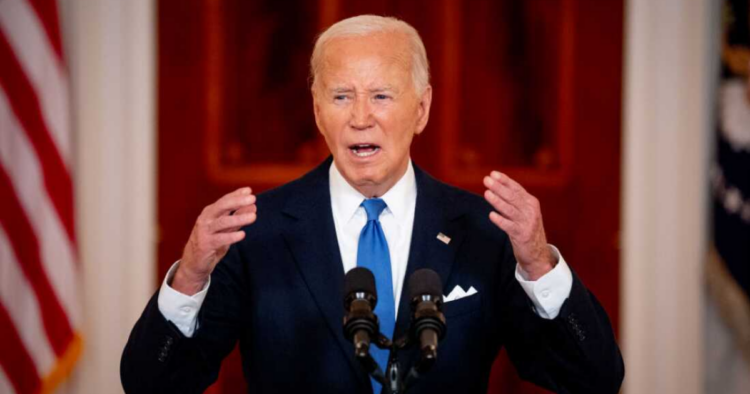President Joe Biden is set to announce a major proposal for overhauling the Supreme Court this Monday. This move would be historic, making him the first sitting president in decades to advocate for significant changes to the way the nation’s highest court operates. The reforms he is proposing include removing presidential immunity from criminal charges, imposing term limits on Supreme Court justices, and establishing a binding code of conduct for the court.
Biden’s plan is aimed at increasing accountability and restoring public trust in the Supreme Court. One key element of his proposal is the “No One Is Above the Law Amendment.” This proposed constitutional amendment would make it clear that former presidents can be indicted, tried, convicted, and sentenced for crimes committed while in office.
This change comes in response to recent Supreme Court decisions that have granted presidents broad immunity from legal consequences for their actions while serving.
Another significant aspect of Biden’s proposal is the introduction of term limits for Supreme Court justices. Currently, justices are appointed for life, which means they can serve until they choose to retire or pass away. Biden’s plan would impose term limits, potentially making the court more dynamic and less prone to being dominated by justices with lifetime tenures.
Additionally, Biden is calling for a binding code of conduct for the Supreme Court. While the court has adopted a code of conduct, it lacks enforcement mechanisms, making it largely symbolic. A binding code would establish clear ethical guidelines and a way to enforce them, aiming to address concerns about justices accepting gifts and vacations from wealthy donors.
Biden’s proposals face significant hurdles. With a divided Congress, it will be difficult to pass these reforms. Republicans, who control the House of Representatives, have already criticized the proposal. House Speaker Mike Johnson argued that the reforms are unlikely to succeed and accused Democrats of trying to change the system simply because they disagree with recent Supreme Court decisions.
Leonard Leo, a prominent conservative legal advocate, also voiced strong opposition. Leo, who is connected to the Federalist Society and has been involved in controversies related to the court’s ethics, dismissed Biden’s proposal as an attempt to undermine a court that conservatives believe is simply following its principles.
Biden’s Motivation and Public Support
Biden’s push for these reforms comes amid growing public discontent with the Supreme Court. Recent polls show that approval of the court is at historic lows, with many Americans disapproving of its decisions. For instance, a recent Marquette Law School poll found that 61% of Americans disapprove of the court’s performance, a significant drop from previous years.
The court’s controversial decisions, including rulings that overturned established precedents such as Roe v. Wade, have contributed to this decline in public trust. Biden and Vice President Kamala Harris have made the court’s actions a central part of their campaign messages, hoping to energize their progressive base and highlight the high stakes of the upcoming election.
The timing of Biden’s announcement is notable. He is set to make his case at an event in Austin, Texas, commemorating the 60th anniversary of the Civil Rights Act. This landmark legislation, signed into law by President Lyndon B. Johnson, was a major step forward in the fight for civil rights. By choosing this occasion, Biden is drawing a parallel between the historical significance of civil rights and the need for reform in the Supreme Court.
Biden’s proposals are part of a broader debate about the structure and function of the Supreme Court. This debate has been ongoing for years, with various lawmakers and advocacy groups pushing for changes. Biden’s proposal, however, represents a more direct and ambitious effort to address these issues at a national level.
Despite Biden’s intentions, implementing these reforms will be challenging. The process of amending the Constitution is complex and requires broad support from both Congress and the states. Given the current political climate and the divided nature of Congress, achieving this level of consensus seems unlikely in the near term.
ALSO READ: “Donald Trump to Speak with FBI in Ongoing Assassination Attempt Investigation”
Moreover, the proposal has faced criticism not only from Republicans but also from some legal experts. While many support the idea of increasing transparency and accountability within the Supreme Court, there are concerns about whether these changes would effectively address the root causes of public distrust.
As Biden prepares to announce his proposal, the nation will be watching closely to see how the debate unfolds. The proposal reflects a growing demand for reform within the Supreme Court and highlights the deep divisions and challenges facing American democracy today.
Whether or not Biden’s proposals gain traction, they mark a significant moment in the ongoing discussion about the role and functioning of the Supreme Court. The outcome of this debate will likely have lasting implications for the court and its role in American society.
President Biden’s proposed reforms to the Supreme Court are ambitious and represent a bold step towards increasing accountability and restoring public trust. While these changes face significant political and practical challenges, they underscore the importance of addressing concerns about the highest court’s integrity and its impact on American democracy.

















Comments